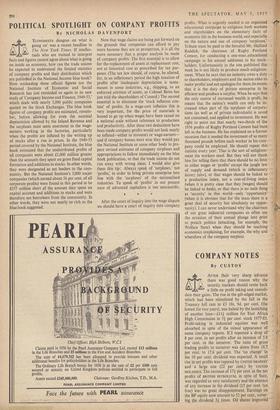POLITICAL SPOTLIGHT ON COMPANY PROFITS
By NICHOLAS DAVENPORT • 'EcoNomisrs disagree on what is going on' was a recent headline in 416.; The New York Times. If intellec-
tuals who are trained to interpret facts and figures cannot agree about what is going on inside an economy, how can the trade unions be expected to understand the limited statistics of company profits and their distribution which are published in the National Income blue book? How misleading these official figures are the National Institute of Economic and Social Research has just reminded us again in its new study of 'Company Income and Finance, 1949-53,' which deals with nearly 3,000 public companies quoted on the Stock Exchanges. The blue book figures of company profits are estimated, remem- ber, before allowing for even the nominal depreciation allowed by the Inland Revenue and the surpluses must seem enormous to the wage- earners working in the factories, particularly when the profits are inflated by the writing up of stocks after a rise in prices. In the 1949-53 period covered by the National Institute, the blue book estimated that the undistributed profits of all companies were about £1,000 million greater than the amounts they spent on gross fixed capital formation and additions to stocks. In other words, they were designated as net lenders to the com- munity. But the National Institute's 3,000 major companies (which earned about 56 per cent. of all corporate profits) were found in this period to be £357 million short of the amount they spent on capital account and additions to stocks and were therefore net borrowers from the community. In other words, they were not nearly so rich as the blue book suggested.
Now that wage claims are being put forward on the grounds that companies can afford to pay more because they are so prosperous, it is all the more necessary that a proper analysis be made of company profits. The first essential is to allow for the replacement of assets at replacement cost, not at historical cost as prescribed for tax pur- poses. (The tax law should, of course, be altered, for, in an inflationary period the high taxation of profits after inadequate depreciation is tanta- mount in some industries, e.g., shipping, to an enforced attrition of assets, as Colonel Bates has just told the shareholders of Cunard.) The second essential is to eliminate the 'stock inflation con- tent' of profits. In a wage-cost inflation this is very important, for the price of materials is bound to go up when wages have been raised on a national scale without reference to production and productivity. After these two deductions have been made company profits would not look nearly so inflated—either to investors or wage-earners— and if company bosses were wise they would pay the National Institute or some other body to pre- pare revised estimates of company surpluses and appropriations to follow immediately on the blue book publication, so that the trade unions do not run away with wrong ideas. I would also give them this tip : Always speak of 'surpluses,' not 'profits,' in order to bring private enterprise into line with the 'surpluses' of the nationalised industries. To speak of 'profits' in our present state of advanced capitalism is too unscientific.
After the court of inquiry into the wage dispute we should have a court of inquiry into company
profits. What is urgently needed is an organised educational campaign to enlighten both workers and shareholders on the elementary facts of economic life in the business world, and especially on the nature and size of company 'surpluses.' Tribute must be paid to the forceful Mr. Halford Reddish,' the chairman of Rugby Portland Cement, for conducting a one-man ,educational campaign in his annual addresses to his stock- holders. Unfortunately in the one published this week he is not likely to produce much enlighten- ment. When he says that an industry owes a duty to shareholders, employers and the nation alike to make 'profits' and not apologise for them, he means that it is the duty of private enterprise to be efficient and produce a surplus. When he says that the only source of increased wealth is profit, he means that the nation's wealth can only be in- creased when part of the surpluses of corpora- tions (as well as of private individuals) is saved not consumed, and applied to investment. He was right to point out that nearly two-thirds of the 1956 profits of Rugby Portland Cement had been left in the business. He has explained on a former occasion that it needed the investment of so many thousand pounds before each worker in his corn- pany could be employed. He should repeat this statistic every year. That is the sort of enlighten- ment the workers need. But they will not thank him for telling them that there should be no limit to either wages or 'profits' except the jungle law of supply and demand (which is inflationary laissez faire), or that wages should be linked to a production index, not a cost-of-living index (when it is pretty clear that they [wages] should be linked to both), or that there is no such thing as 'security' in this world—only 'opportunity' (when it is obvious that for the mass there is a great deal of security but absolutely no oppor- tunity). I can never understand why the chairmen of our great industrial companies so often use the occasion of their annual plunge into print to preach politics (attacking, for example, the Welfare State) when they should be teaching economics (explaining, for example, the why and wherefore of the company surplus).










































 Previous page
Previous page